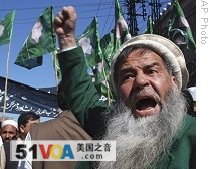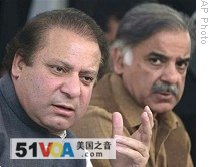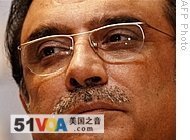Islamabad
27 February 2009
 |
| A Pakistani supporter of former Prime Minister Nawaz Sharif reacts during a demonstration in Peshawar, Pakistan, 27 Feb. 2009 |
Supporters of former Prime minister Nawaz Sharif have been holding street protests and battling police since Wednesday when the Supreme Court banned Sharif, the leader of the opposition Pakistan Muslim League-N, from running in future elections. The ruling also disqualified and removed his younger brother, Shahbaz Sharif, as the head of the government in the province of Punjab.
 |
| Nawaz Sharif, left, speaks as his brother Shahbaz Sharif looks on in Lahore (file |
The political atmosphere further deteriorated after the president imposed executive rule (known as governor's rule) in Punjab in an attempt allegedly to bring his Pakistan Peoples Party, or PPP, to power in the province that had been ruled by Sharif's brother.
In a speech delivered late Thursday, Sharif urged officers and police in Punjab not to obey the orders of what he called "unconstitutional rulers". The former prime minister promised that officers who will do so will be rewarded once his party returns to power in Punjab.
Anti-government demonstrators chanting anti-Zardari slogans at protests in Punjab clashed with police who fired tear gas in an effort to disperse the crowds. Scores of people were detained.
Many critics of the government's actions say that at a time when the country is faced with rising threat of extremism, the Pakistani president should have allowed the PML-N-dominated provincial legislature to elect a new majority leader to replace Sharif's brother.
Even Sharif's critics like Senator Mushahid Hussain of a smaller opposition party in the parliament, known as PML-Q, are criticizing the president for imposing executive rule in Punjab.
"It is a recipe for destabilization and it has the potential, a domino effect, of unraveling the whole system if it is not reversed in time," he said. "There was no justification at all for trying to topple the Punjab government or try to convert a minority into a majority through executive fiat, which has been done. It is a reversion to the worst practices of bad politics of the past."
 |
| Pakistani President Asif Ali Zardari (file) |
Sharif's PML-N and Zardari's party have been the two main rival political parities of Pakistan struggling for power. They are known for trying to sabotage the government when the other party is in power.
Observers say that the political turmoil that erupted in Pakistan this week has added a new dimension to the Obama administration's regional review of U.S strategy in Afghanistan and Pakistan for defeating al-Qaida-led terrorists.